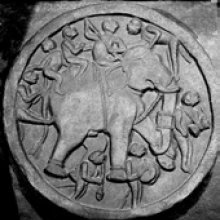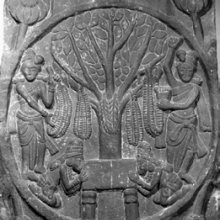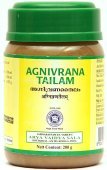An, Aṅ, Añ, Aṇ, Āṅ, Aṉ, Āṉ: 16 definitions
Introduction:
An means something in Hinduism, Sanskrit, Buddhism, Pali, Hindi, Tamil. If you want to know the exact meaning, history, etymology or English translation of this term then check out the descriptions on this page. Add your comment or reference to a book if you want to contribute to this summary article.
Images (photo gallery)
(+1049 more images available)
In Hinduism
Vyakarana (Sanskrit grammar)
Source: Wikisource: A dictionary of Sanskrit grammarAṅ (अङ्).—The vikaraṇa before luṅ affixes, substituted for the affix cvi (च्वि (cvi)) in the case of the roots mentioned by Pāṇini in sūtras III.1.52-59:(2) the Vikaraṇapratyaya in Vedic Literature before the benedictive affixes prescribed by Pāṇini in Sūtra III.1.86; (3) kṛt affix in the feminine gender showing verbal activity applied to roots marked with the mute letter ष् (ṣ) and the roots भिद्, छिद् (bhid, chid) and others. P.III.3 104-106.e.g. जरा, त्रपा, भिदा, छिदा (jarā, trapā, bhidā, chidā) etc.
--- OR ---
1) Añ (अञ्).—tad. affix a (अ) with the mute letter ñ (ञ् (ñ)), prescribed (i) after the words उत्स (utsa) and others in various senses like progeny, dyed in, produced in, come from etc.P. IV.1.86, (ii) after the words विद (vida) and others in the sense of grandson and other descendents.P. IV.1.104. For other cases see P. IV. I. 141, 161; IV.2.12,14 etc. IV.3.7 etc. IV.4.49. The feminine is formed by adding i (ई) to words ending with this affix अञ् (añ), which have the vṛddhi vowel substituted for their initial vowel which gets the acute accent also e.g. औत्सः, औत्सी,औदपानः, बैदः, बैदी (autsaḥ, autsī, audapānaḥ, baidaḥ, baidī).
--- OR ---
Aṇ (अण्).—(I) token term (प्रत्याहार (pratyāhāra)) for all vowels and semivowels which, when prescribed for an operation, include all such of their sub-divisions as are caused by length, protraction accent or nasalization. cf अणुदित्सवर्णस्य चाप्रत्ययः (aṇuditsavarṇasya cāpratyayaḥ) P. I.1.60;(2) token term for the vowels अ, इ (a, i) and उ (u) in all Pānini's rules except in the rule -I.1.69 given above e.g see ढ्रलोपे पूर्वस्य दीर्घोणः (ḍhralope pūrvasya dīrghoṇaḥ) P.VI.3. 111, केऽणः (ke'ṇaḥ) P.VII.4.13. and अणोऽ प्रगृह्यस्य (aṇo' pragṛhyasya). P.VIII.4.57: (3) tad, affix. a (अ) prescribed generally in the various senses such as 'the offspring', 'dyed in,' 'belonging to' etc. except in cases where other specific affixes are prescribed cf प्राग्दीव्यतोऽण् (prāgdīvyato'ṇ) P. IV.1.83; (4) kṛ. affix a (अ), applied, in the sense of an agent, to a root with an antecedent word (उपपद (upapada)) standing as its object. e. g. कुम्भकारः (kumbhakāraḥ), see P.III.2.1: काण्डलावः (kāṇḍalāvaḥ), see P.III.3.12.
--- OR ---
An (अन्).—tad. affix अ (a) (अन् (an)) (1) added to the word नीली (nīlī) in the sense of 'dyed in', to form the word नील (nīla),cf. P. IV.2.2. Vārt. 2; (2) added to the word अषाढा (aṣāḍhā) in the sense of 'produced in' cf अषाढाः उपदधाति (aṣāḍhāḥ upadadhāti) M. Bh. on IV.3.34 Vārt. 2; (3) added after the affix तीय (tīya) in the same sense as तीय (tīya) e.g. द्वितीयो भागः, तृतीयो भागः (dvitīyo bhāgaḥ, tṛtīyo bhāgaḥ) cf. पूरणाद् भागे तीयादन् (pūraṇād bhāge tīyādan) P.V.3.48.
--- OR ---
Āṅ (आङ्).—The preposition आ. See the word आ (ā) above.

Vyakarana (व्याकरण, vyākaraṇa) refers to Sanskrit grammar and represents one of the six additional sciences (vedanga) to be studied along with the Vedas. Vyakarana concerns itself with the rules of Sanskrit grammar and linguistic analysis in order to establish the correct context of words and sentences.
Languages of India and abroad
Pali-English dictionary
Source: Sutta: The Pali Text Society's Pali-English DictionaryAn-, form of the neg. prefix a-before vowels. For negatives beginning with an° see the positive. (Page 30)

Pali is the language of the Tipiṭaka, which is the sacred canon of Theravāda Buddhism and contains much of the Buddha’s speech. Closeley related to Sanskrit, both languages are used interchangeably between religions.
Sanskrit dictionary
Source: DDSA: The practical Sanskrit-English dictionaryAṇ (अण्).—P.
1) To sound.
2) (4 A) To breathe, live (for an).
--- OR ---
An (अन्).—2 P. [अनिति, आन-नी-त्, आन, अनितुम्, अनित (aniti, āna-nī-t, āna, anitum, anita)]
1) To breathe; आनीदवातं स्वधया तदेकम् (ānīdavātaṃ svadhayā tadekam) Ṛgveda 1.129.2.
2) To move, go about, live; को ह्येवान्यात् यद्येष आकाश आनन्दो न स्यात् (ko hyevānyāt yadyeṣa ākāśa ānando na syāt) Taitt. Up.
3) To gasp, pant with thirst (Ved.). -Caus. आनयति (ānayati); desid. अनिनिषति (aniniṣati).
4) A. To live. -1 P. आनयति (ānayati). also 1 P. अनति (anati), to worship.
--- OR ---
An (अन्).—m. [kvip] The soul; विश्वे चनेदना (viśve canedanā) Ṛgveda 4.3.3.
Source: Cologne Digital Sanskrit Dictionaries: Edgerton Buddhist Hybrid Sanskrit DictionaryAn (अन्) or A.—(°-), negative prefix: (1) prefixed to finite verbs, as rarely in Sanskrit (Renou p. 175) but rather often in Pali (Critical Pali Dictionary s.v. 7); here not common: apaśyanti Saddharmapuṇḍarīka 324.2; anatikramāmo Mahāvastu ii.80.8; anicchiyati (?) Mahāvastu iii.295.18; see § 23.17; (2) in sense described for Pali in Critical Pali Dictionary s.v. 2, a [compound] in a- following the same word without a-, and preceding a form of kṛ: samitim asamitiṃ kṛtvā Divyāvadāna 41.10, lit. making the assembly no assembly, i.e. quitting the assembly; tasya vacanam avacanaṃ kṛtvā Divyāvadāna 41.28, disregarding his advice. See an-a-.
Source: Cologne Digital Sanskrit Dictionaries: Shabda-Sagara Sanskrit-English DictionaryAṇ (अण्).—[aṇa] r. 1st. cl. (aṇati) To sound. (ṅa,) 4th cl. (aṇyate) To breathe, to live; with pra, to exist, to live. See ana.
Source: Cologne Digital Sanskrit Dictionaries: Benfey Sanskrit-English DictionaryAṇ (अण्).—i. 1, [Parasmaipada.] To sound. i. 4, [Ātmanepada.] To breathe (cf. an).
--- OR ---
An (अन्).—[an-], before consonants a' a-, an inseparable prefix, implying I. negation, e. g. a-brāhmaṇa, m. One who is not a Brāhmaṇa, [Mānavadharmaśāstra] 7, 85. a-jñāna, n. Ignorance, [Mānavadharmaśāstra] 11, 145. an-anta, adj. Endless, [Mānavadharmaśāstra] 4, 149. In this use it produces very often the opposite signification, e. g. a-gada, m. Health, [Mānavadharmaśāstra] 11, 237. a-krūra, adj. Soft, [Mānavadharmaśāstra] 2, 34. a-sakrit, adv. Often, [Mānavadharmaśāstra] 3, 233. Ii. deterforation. 1. Wrong, e. g. a-kāla, m. Unseasonable time, [Mānavadharmaśāstra] 3, 105. 2. Bad, a-ksketra, n. A bad field, [Mānavadharmaśāstra] 10, 71.
— Cf. [Latin] in-, [Gothic.] and [Anglo-Saxon.] un-, and
--- OR ---
An (अन्).—ii. 1, [Parasmaipada.] † i, 4, [Ātmanepada.] 1. To breathe. 2. To blow (as wind). 3. To live.
— Cf. [Latin] animus, ānus (cf. Sskr. apāna); [Gothic.] uz-ana; see prāna.
Source: Cologne Digital Sanskrit Dictionaries: Cappeller Sanskrit-English DictionaryAn (अन्).—aniti anati breathe, live.
Source: Cologne Digital Sanskrit Dictionaries: Monier-Williams Sanskrit-English Dictionary1) Aṇ (अण्):—[class] 1. [Parasmaipada] aṇati, āṇa, aṇitum, to sound, [cf. Lexicographers, esp. such as amarasiṃha, halāyudha, hemacandra, etc.] : [class] 4. [Ātmanepada] aṇyate, to breathe, (another form of √an q.v.; in this sense regarded in the Dhātu-pāṭha as a distinct root), [cf. Lexicographers, esp. such as amarasiṃha, halāyudha, hemacandra, etc.]
2) An (अन्):—1. an occasionally ana, (before a vowel) the substitute for 3. a, or a privative.
3) 2. an [class] 2. [Parasmaipada] aniti or anati, āna, aniṣyati, ānīt ([Ṛg-veda x, 129, 2]), to breathe, respire, gasp;
—to live, [cf. Lexicographers, esp. such as amarasiṃha, halāyudha, hemacandra, etc.];
—to move, go, [cf. Lexicographers, esp. such as amarasiṃha, halāyudha, hemacandra, etc.] (cf. [Greek] ἄνεμος [Latin] animus) :—[Causal] ānayati:—[Desiderative] aniniṣati.
Source: Cologne Digital Sanskrit Dictionaries: Goldstücker Sanskrit-English DictionaryAṇ (अण्):—I. (aṇa-bhvādi-udātta-udāttet) r. 1st cl. par. (aṇatiāṇa-aṇitā.—Desid. aṇiṇiṣati. Caus. āṇayati) To sound. Ii. (aṇa-divādi-udātta-anudāttet) r. 4th cl. ātm. (aṇyate). To breathe. See an.
Source: Cologne Digital Sanskrit Dictionaries: Yates Sanskrit-English Dictionary1) Aṇ (अण्):—aṇati 1. a. To sound.
2) [(ya-ṅa) aṇyate] 4. d. To live; with pra to live or breathe.
3) An (अन्):—(lu, gha) aniti 2. a. To live or breathe.
4) (ya, ṅa) anyatte 4. d. To live.
Source: DDSA: Paia-sadda-mahannavo; a comprehensive Prakrit Hindi dictionary (S)Ān (आन्) in the Sanskrit language is related to the Prakrit word: Āṇama.
[Sanskrit to German]
Sanskrit, also spelled संस्कृतम् (saṃskṛtam), is an ancient language of India commonly seen as the grandmother of the Indo-European language family (even English!). Closely allied with Prakrit and Pali, Sanskrit is more exhaustive in both grammar and terms and has the most extensive collection of literature in the world, greatly surpassing its sister-languages Greek and Latin.
Hindi dictionary
Source: DDSA: A practical Hindi-English dictionary1) An in Hindi refers in English to:——a Hindi prefix used to impart a negative sense, as ~[mela, ~honi]..—an (अन) is alternatively transliterated as Ana.
2) An in Hindi refers in English to:—([na])[hadanada] —In Indian terminology pertaining to Yog, a mysterious sound born within (without any impact between objects) and audible only to the Yogi:..—an (अन) is alternatively transliterated as Ana.
3) An (अन्):——a Sanskrit prefix to words beginning with vowels, signifying negation (e.g.) [anabhijña, anācāra, anaṃta].
...
Kannada-English dictionary
Source: Alar: Kannada-English corpusAṇ (ಅಣ್):—
1) [verb] to reach by hand; to touch.
2) [verb] to be, come or go very close.
--- OR ---
Aṇ (ಅಣ್):—[noun] a string or a rope for tying a dog.
--- OR ---
Aṇ (ಅಣ್):—[noun] a suffix denoting direction, (as east, west etc.).
--- OR ---
Āṇ (ಆಣ್):—
1) [noun] a human being; a woman or a man.
2) [noun] (gen.) a man.
3) [noun] ಆಣೆರಕಗೊಳ್ [anerakagol] āṇerkagoḷ to assume a human.
--- OR ---
Ān (ಆನ್):—
1) [verb] to face or act in opposition; to oppose.
2) [verb] to have on the body (as a dress); to wear; to have, possess afresh a new form.
3) [verb] to receive; to take.
4) [verb] to seize in the hands; to hold; to catch; to grasp.
5) [verb] to stretch forward (as a hand in begging).
6) [verb] to stop oneself from moving.
7) [verb] to tolerate; to put up with (someone or something not especially liked).
8) [verb] to take shelter in or under.
9) [verb] to recline on or against.
10) [verb] to give shelter, protection; to support or act as a prop; to bear the burden; ಆಂತವನ್ [amtavan] āntavan he who has opposed.
11) [verb] he who has borne the burden.
12) [verb] ಆತು ಉಣ್ಣು [atu unnu] ātu uṇṇu to eat, have food, slowly (i.e. with no hurry); ಆತುಕೊ [atuko] ātuko = ಆತುಕೊಳ್ಳು [atukollu]. ಆತುಕೊಳ್ಳು [atukollu] ātukoḷḷu to seize and hold; to catch; 2. to act in opposition; to oppose; ಆತುಹೋಗು [atuhogu] ātuhōgu to go unhurriedly.
--- OR ---
Ān (ಆನ್):—[pronoun] the nominative singular of the first personal pronoun; the word mentioning oneself; the one who is speaking or writing; "I".
--- OR ---
Ān (ಆನ್):—[adverb] (expressing uncertainty, probability, etc.) so ever; even.
Kannada is a Dravidian language (as opposed to the Indo-European language family) mainly spoken in the southwestern region of India.
Tamil dictionary
Source: DDSA: University of Madras: Tamil LexiconAṇ (அண்) noun
1. Upper part; மேல். ((சங்கத்தகராதி) தமிழ்சொல்லகராதி) [mel. ((sangathagarathi) thamizhsollagarathi)]
2. Leash for dogs, running knot; வேட்டை நாயின் உருவுகயிறு. [vettai nayin uruvugayiru.] (W.)
3. Notch, indentation cut in a stick; தடியில் வெட்டிய வரை. [thadiyil vettiya varai.] (R.)
--- OR ---
Aṉ (அன்) particle
1. Verb-ending: (a) of the rational class in the 3rd person singular masculine as in அவன் வருவன்; ஆண்பால் வினைவிகுதி [avan varuvan; anpal vinaiviguthi]; (b) of the 1st person singular as in யான் வருவன்; தன்மை யொருமை வினைவிகுதி. [yan varuvan; thanmai yorumai vinaiviguthi.]
2. Noun suffix (a) of the rational class masculine singular as in மலையன், ஆண்பாற் பெயர் விகுதி [malaiyan, anpar peyar viguthi]; (b) of a participial noun, masculine singular as in வருபவன்; ஆண்பால் வினையாலணையும்பெயர்விகுதி. [varupavan; anpal vinaiyalanaiyumbeyarviguthi.]
3. An euphonic augment as in ஒன்றன்கூட்டம்; சாரியை. [onrankuttam; sariyai.]
--- OR ---
Āṇ (ஆண்) noun < ஆள்-. [al-.]
1. [Kanarese, Malayalam: Travancore usage āṇ.] Male; ஆண்பாற்பொது. [anparpothu.]
2. Manliness, courage; வீரியம். மான மதாணி யாணிற் றாங்கல் [viriyam. mana mathani yanir rangal] (ஞானாமிர்தம் [gnanamirtham] 17, 7).
3. Superiority, excellence; தலைமை. [thalaimai.] (மாறனலங்காரம் [maranalangaram] 261, உதா. செய். [uthara kandam sey.] 726, உரை. [urai.]) +. Warrior of an army; வீரன். ஆணணி புகுதலும் [viran. anani puguthalum] (பத்துப்பாட்டு [pathuppattu] 211).
5. See ஆண்மரம். [anmaram.] 2,
3. ஆண்மரக்கிளவி [anmarakkilavi] (தொல். எழுத். [thol. ezhuth.] 304).
--- OR ---
Āṉ (ஆன்) noun < ஆ⁸. [a⁸.] [Malayalam: ān, T. āvu.]
1. Female of the buffalo, ox or deer; எருமை, பெற்றம், மரை இவற்றின் பெண். (திவா.) [erumai, perram, marai ivarrin pen. (thiva.)]
2. Ox; இடபம். ஆன்முகத்த னடற்கண நாயகன் [idapam. anmugatha nadarkana nayagan] (கந்தபு. பானுகோ. [kanthapu. panugo.] 95).
--- OR ---
Āṉ (ஆன்) adverb < அ. [a.] There, in that place; அவ்விடம். [avvidam.] (தொல். பொ. அகத். [thol. po. agath.] 24, இளம். [ilam.])
--- OR ---
Āṉ (ஆன்) particle
1. An instrumental ending, as in மண்ணானியன்ற குடம்; மூன்றனுருபு. [mannaniyanra kudam; munranurupu.] (தொல். சொல். [thol. sol.] 75, உரை. [urai.])
2. Ending common to nouns and verbs of the 3rd person masculine singular; ஆண்பாற் பெயர்வினைகளின் விகுதி. ஊரான், வந்தான். [anpar peyarvinaigalin viguthi. uran, vanthan.]
3. An euphonic increment, used with a modification of பத்து [pathu] 'ten', as in இருபான்; ஒரு சாரியை. [irupan; oru sariyai.] (நன். [nan.] 244.)
Tamil is an ancient language of India from the Dravidian family spoken by roughly 250 million people mainly in southern India and Sri Lanka.
See also (Relevant definitions)
Starts with (+9980): A-nalikal, Aanandamay, Aandolankaaree, Aang-dhakk-phulnu, Aang-gahron-hunu, Aankhaa-tarnu, Aankhe, Aankhla, Aantarik, Aantbheu, Akkasya, Amcadi, Amcate, Amce, Amcebastu, Amcecila, Amceciti, Amcedabba, Amcedabbi, Amcedara.
Ends with (+9980): A-cakayacuran, A-mid o-raw a-tyan, A-ngubanan, Aadan--pradaan, Aadikiran, Aadumilukkan, Aagamanaatmak-samanyikaran, Aagman, Aajivan, Aakaasagarudan, Aakhyan, Aaman, Aan, Aatmaniyantran, Aay-antiran, Aay-eyinan, Aba odan, Abadan, Abakan, Abaladhanvan.
Full-text (+79494): Nupura, Matanga, Apriccha, Kumbha, Alinjara, Akhya, Audgatra, Asmana, Shilpin, Pasava, Ajna, Aina, Naga, Bana, Pratima, Adeshtri, Abhasa, Abha, Ashamsa, Kuthatanka.
Relevant text
One of your search terms exceeds the minimun character amount per search term. This amount currently equals 2.
No search results for An, Aṅ, Añ, Aṇ, Āṅ, Aṉ, Āṉ, Ān, Āṇ, Aan; (plurals include: Aans) in any book or story.
Related products
(+615 more products available)











